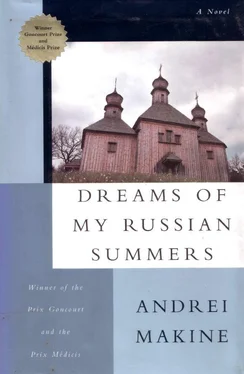Yes, I had lived out a part of my life. Childhood.
In the end, our conversations about the rain and the fine weather that summer were not wholly unjustified. It rained often, and my sadness has colored my memory of those holidays with misty and lukewarm hues.
Sometimes out of the depths of this slow grayness of days, an echo of our evening gatherings in the past surfaced – some photo that I discovered by chance in the Siberian suitcase, the contents of which had long since held no secrets for me. Or from time to time a fleeting detail of the family history, which was as yet unknown to me and which Charlotte offered me with the timid joy of a bankrupt princess, suddenly finding a small coin of fine gold beneath the threadbare lining of her purse.
Thus it was that one day when it was raining hard, as I leafed through the piles of old French newspapers amassed in the suitcase, I lit upon a page that probably came from an illustrated magazine at the turn of the century. It was a reproduction, faintly covered in a brown-and-gray tint, of a painting in that highly wrought realistic style, whose attraction lies in its precise and abundant details. It was through examining these details during the long rainy evening that I retained a memory of the subject. A very disparate column of soldiers, all visibly suffering from exhaustion and old age, was crossing the street of a poor village with bare trees. The soldiers were all of advanced years – old men, it seemed to me, with long white hair escaping from broad-brimmed hats. They 'were the last able-bodied men in a mass recruitment of a people already engulfed in war. I did not memorize the title of the picture, but it contained the word "last." They were the last to face the enemy, the very last to be able to bear arms. The latter, furthermore, were very rudimentary; some pikes, axes, old sabers. Curious, I scrutinized their clothes; their enormous army boots with large copper buckles; their hats and occasionally a tarnished helmet, like that of the conquistadors; their gnarled fingers, gripping the pike handles… France had always appeared before my eyes in the splendor of her palaces, at the glorious hours of her history, but was suddenly revealed in the shape of this northern village, where low houses huddled behind meager hedges, and where stunted trees shivered in the winter wind. Astonishingly, I felt a close affinity for this muddy road and these old warriors, doomed to fall in an unequal battle. No, there was nothing flamboyant in their demeanor. They were not heroes making a show of their gallantry or their self-sacrifice. They were simple, human. In particular there was one, wearing the old conquistador-style helmet, a very tall old man who walked, leaning on a pike, at the end of the column. His face captivated me with its surprising serenity, bitter and smiling at the same time.
Deep in my adolescent melancholy, I was suddenly overwhelmed with a confused joy. I felt I had understood the calm of this old warrior as he confronted imminent defeat, suffering, and death. Neither a stoic nor a holy fool, he walked with his head held high across this flat, cold, and dull country, which he loved despite everything, and called it his "homeland." He appeared invulnerable. For a fraction of a second my heart seemed to beat in time with his, triumphing over fear, death, and solitude. This defiance felt like a new chord in the living harmony that for me was France. I tried at once to find a name for it. Patriotic pride? Panache? Or the famous furia francese that the Italians recognized in French fighters?
As I was calling these labels to mind, I saw that the face of the old soldier was slowly closing and his eyes growing dull. He became once more a figure in an old reproduction of a painting in gray and bister tints. It was as if he had averted his gaze to hide from me that mystery of his, of which I had just caught a glimpse.
Another flash from the past was the woman – the one in a padded jacket and a broad shapka , whose photo I had discovered in an album filled with photos dating from our family's French period. I recalled that this photo had disappeared from the album immediately after I had shown an interest in it and spoken about it to Charlotte. I tried to remember why I had failed to obtain a reply at the time. The scene appeared before my eyes: I am showing the photo to my grandmother, and suddenly I see a rapid shadow passing that makes me forget my question: on the wall I cover a strange moth with my hand, a hawkmoth with two heads, two bodies, and four wings.
I told myself that now, four years later, the double hawkmoth no longer held any mystery for me: quite simply two moths coupling. I thought of people coupling, and tried to imagine the movement of their bodies… And suddenly I understood that for months already, possibly years, I had been thinking of nothing but these bodies, entwined, merging. I had been thinking about this without realizing it, at every moment of the day, while speaking of other things. As if the feverish caress of the hawkmoth had been burning my palm the whole time.
Questioning Charlotte to find out who that woman in the padded jacket was now seemed an absolute impossibility. An impenetrable barrier was arising between my grandmother and myself: the female body, dreamed of, desired, possessed a thousand times in my thoughts.
That evening, pouring me a cup of tea, Charlotte said in a preoccupied voice, "It's funny, the Kukushka hasn't been past yet…"
Emerging from my reverie, I looked up at her. Our eyes met… We said nothing else to each other until the end of the meal.
The three women changed my outlook, my life…
I had discovered them by chance on the back of a press cutting in the depths of the Siberian suitcase. I was reading yet again the article about the first "Peking-Paris via Moscow" car race, as if to prove to myself that there was nothing new to learn, that Charlotte's France was well and truly exhausted. Absentmindedly I had let the page slip onto the carpet. I had been looking through the balcony's open door. It was a special kind of day at the end of the month of August, cool and sunny, when the chill wind blowing across the Urals brought the first breath of autumn to our steppes. Everything shone in this limpid light. The trees of the Stalinka stood out with fragile clarity against a sky of revitalized blue. The line of the horizon was pure and incisive. With bitter relief I told myself that the end of the holidays was approaching. The end also of a stage in my life, an end marked by this extraordinary discovery: that all my knowledge ensured neither happiness nor privileged access to what was essential… Another revelation also: the whole time I was thinking about the female body, about women's bodies. All other thoughts were complementary, accidental, derivative. Yes, I was facing the fact that being a man meant thinking constantly of women, that a man was nothing but a dreamer about women! And that was what I was turning into…
By a whimsical caprice, the page of the magazine had turned over as it slipped onto the carpet. I picked it up, and as I did so I saw them on the back, these three women from the turn of the century. I had never seen them before, having regarded the reverse side of this press cutting as nonexistent. This unexpected encounter intrigued me. I took the photo closer to the light coming from the balcony…
And suddenly I fell in love with them. With their bodies and with their tender and attentive eyes, which allowed one to guess only too well at the presence of a photographer crouched under a black cloth, behind a tripod.
Their femininity was such as would inevitably touch the heart of a solitary and shy adolescent like myself. It was, in a way, a normative femininity. All three wore long black dresses that enhanced the ample roundness of their bosoms and hugged their hips; but notably, before embracing their legs and spreading into graceful folds around their feet, the fabric sketched the discreet curve of their stomachs. The chaste sensuality of this gently rounded triangle fascinated me!
Читать дальше












